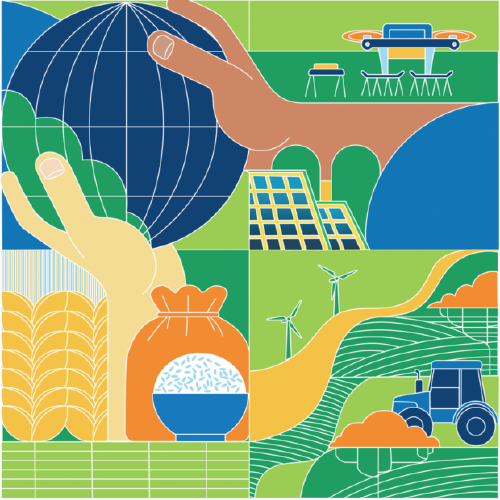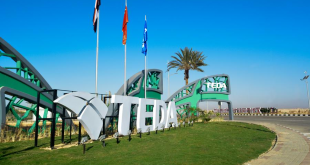Published: February 14,2023
By GERT GROBLER

SHI YU/CHINA DAILY
The World Bank and the International Monetary Fund predicted very recently that the global economic growth will slow down. The IMF, however, pointed out that output would be more resilient than previously anticipated, inter alia, due to the reopening of China’s economy and that a global recession would probably be avoided.
Despite these cautious predictions, Akinwumi Adesina, president of the African Development Bank, expressed a more positive outlook for Africa on Jan 19, saying that the continent is “set to outperform the rest of the world in economic growth over the next two years, with real gross domestic product (growth) averaging around 4 percent in 2023 and 2024 “.
An AfDB report furthermore reflected that all the continent’s five regions remain resilient with a steady outlook for the medium-term, despite facing significant headwinds due to global socio-economic shocks. As regards sub-Saharan Africa, the IMF anticipates that its economic growth will increase moderately to 3.8 percent in 2023 and climb to 4.1 percent in 2024.
The AfDB, however, cautioned in its report that risks including tightening global financial conditions, with the associated increase in domestic debt service costs as well as soaring food and energy prices as a result of climate change with its damaging impact on domestic food supply, continue to pose considerable threats to the continent.
Agriculture is a major source of income for most of the rural population of vast parts of Africa. It accounts for half of total employment and more than 32 percent of Africa’s gross domestic product.
Africa has substantial agro-ecological resources but for many reasons, the significant potential of the continent’s agricultural growth has yet to be realized. Paradoxically, food security, for one, is not assured. An “agricultural revolution” is needed with enhanced modernization, seeking solutions through technology transfers, mechanization and increased productivity.
It is in this context that African governments have consistently viewed agriculture as an important driver of growth, development and jobs on the continent. The AU adopted the Comprehensive Africa Agriculture Development Programme in 2003, a framework with the aim to accelerate coordinated economic and structural transformation by improving agricultural productivity, increasing investment and sharing knowledge.
While many challenges require urgent attention, one of the top priorities is establishing food security which is crucial for sustainable economic development and the long-term prosperity of the African continent. At least one in five Africans goes to bed hungry and an estimated 140 million people in Africa face acute food insecurity, according to the 2022 Global Report on Food Crises 2022 Mid-Year Update produced by the UN World Food Programme, UN Food and Agriculture Organization and other specialized organizations.
Projections show that by 2050, Africa’s population will double. By 2100, one in three people on Earth will be African. Sub-Saharan Africa is home to more than 1 billion people, half of whom will be under the age of 25 years by 2050.
Considering the importance of the agricultural sector for a large segment of the African population, many African countries, while continuing to make progress, are in need of technical assistance to attain higher agricultural growth and find sustainable solutions to their food security challenges. African countries are therefore calling for more international cooperation, focusing on resources, technology, and development support to transform Africa’s agricultural sector.
Agriculture is a significant part of Africa-China cooperation and is of fundamental interest to both sides. Since the decolonization of Africa, China has transferred advanced Chinese agro-food technology to Africa in order to support the continent to mitigate its agricultural challenges. The goal is to leverage Africa and China’s public and private resources such as funding, product and technology and knowledge to promote and sustain inclusive agriculture transformation in Africa. With its many strengths, China’s agricultural development model has proven to be especially valuable to African countries in their endeavors to improve agro-productivity and meet their real and own needs.
Many Africa-China agreements were therefore concluded over the past decade or two to enhance cooperation on agricultural modernization, development of agro-industries, capacity building of young pioneers in farm development, and to increase the export potential of agricultural products as well as food security.
Registering an average annual growth of 14 percent, the trade volume of agricultural products between Africa and China has huge growth potential. But the relationship is not just about trade. According to the Chinese government, nearly 10,000 agricultural officials, technicians, farmers and students from African countries receive training in China each year.
The Chinese government has also launched cooperation programs with agricultural research institutes in more than a dozen African nations and established agricultural technology demonstration centers in 23 African countries which have actively facilitated the ongoing transfer of technology and skills from China to the continent. China continues to strengthen cooperation to help Africa’s agricultural development and poverty eradication efforts, including the appreciated initiative of sending 500 agricultural experts to the continent over the next three years.
The establishment of the Forum on China-Africa Cooperation in 2000 has injected significant momentum into agricultural cooperation, delivering tangible outcomes to the African people and also toward the implementation of the AU Agenda 2063 and UN 2030 Agenda for Sustainable Development. The FOCAC Dakar Action Plan of 2021 includes a number of constructive proposals to extend agricultural cooperation to include the whole industry chain and to continue to share experiences in job creation and poverty reduction through agriculture with a strong focus on alleviating food security. Also of increasing significance is the agreement to advance comprehensive cooperation on climate change with the aim of transitioning to clean and low-carbon energy and to improve the quality of the continent’s development with green cooperation.
Given China’s reputation as a staunch defender of world food security and contributor to global poverty reduction, Africa attaches great importance to its mutually beneficial agricultural cooperation with China which has rapidly grown, establishing a solid foundation for enhanced practical cooperation in the future. Africa welcomes China’s declared approach of strengthening international cooperation with all countries in the interest of global economic growth, development and promotion of economic re-globalization.
The long-standing friendship and excellent relations between China and Africa were strongly reaffirmed by the highly constructive visit of Chinese Foreign Minister Qin Gang to five African countries last month. Africa is of the view, with the support of China, that the continent should be “a stage for international cooperation, not a wrestling ground for major-power rivalry” as was so eloquently stated by Qin during his visit to Ethiopia.
The author is a senior research fellow at the Institute of African Studies at Zhejiang Normal University and a former senior diplomat in the South African Department of International Relations and Cooperation.
China Daily Global
 Africa -China Review Africa -China Cooperation and Transformation
Africa -China Review Africa -China Cooperation and Transformation
